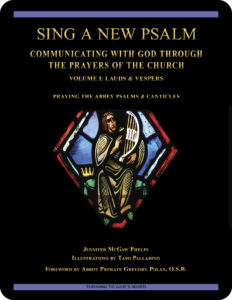 Sing a New Psalm:
Sing a New Psalm:
Communicating with God Through
the Prayers of the Church
Volume I: Lauds & Vespers
Lesson 18 What God Is As Great As Our God?
Psalm 77, Psalm 87, and Psalm 96
Monday Lauds (Week II)
Revised Standard Version Catholic Edition (RSVCE)*
New American Bible Revised Edition (NABRE)*
Catechism of the Catholic Church
ex libris (in our library)
next lesson: For the Peace of Jerusalem Pray
This material coordinates with Lesson 18 on pages 74–77 in Sing a New Psalm: Communicating with God Through the Prayers of the Church—Volume I: Lauds & Vespers. Our Catholic Bible study is based on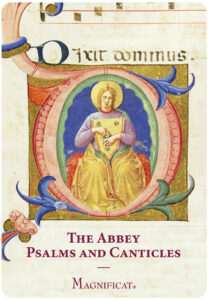 The Abbey Psalms and Canticles, an English translation of the Psalms prepared by the monks at Conception Abbey in 2010 and first published as The Revised Grail Psalms. The Abbey Psalms and Canticles is a revision of that work, finished in 2020 and published by the United States Conference of Catholic Bishops (USCCB). Wording and numbering of some Psalms and verses in other translations may differ. This new translation of the Psalms in the process of being added to all English-language Liturgy of the Hours books used in the United States. The USCCB also plans a liturgical Bible based on the NABRE translation.
The Abbey Psalms and Canticles, an English translation of the Psalms prepared by the monks at Conception Abbey in 2010 and first published as The Revised Grail Psalms. The Abbey Psalms and Canticles is a revision of that work, finished in 2020 and published by the United States Conference of Catholic Bishops (USCCB). Wording and numbering of some Psalms and verses in other translations may differ. This new translation of the Psalms in the process of being added to all English-language Liturgy of the Hours books used in the United States. The USCCB also plans a liturgical Bible based on the NABRE translation.
“Unlike other prayers in sacred Scripture, the prayers contained in the Psalms are not inserted into a narrative story that specifies their meaning and function. Instead, the Psalms are given to the believer precisely as a text of prayer. Since they are the Word of God, the believer who prays the Psalms speaks to God using the very words that God himself has given to us. Thus, in praying the Psalms we learn to pray. The Psalms are a school of prayer.”—Pope Benedict XVI
welcome to our in-depth study of the Psalms
We invite groups and individuals to check out the sample first lesson from this 28- lesson Turning to
lesson Turning to  God’s Word Catholic Bible study. Our online study pages include additional questions, commentary, and prayers based on the Psalm texts. Sing a New Psalm: Communicating with God Through the Prayers of the Church—Volume I: Lauds & Vespers has been granted an imprimatur. A digital version of this study can be purchased from our website shop. Volume II: Vigils, Day Prayer & Compline is scheduled for publication in 2025. If you have a Bible-related question or comment, click on one of the “ask us your question” or “what do you think” buttons on any online study page.
God’s Word Catholic Bible study. Our online study pages include additional questions, commentary, and prayers based on the Psalm texts. Sing a New Psalm: Communicating with God Through the Prayers of the Church—Volume I: Lauds & Vespers has been granted an imprimatur. A digital version of this study can be purchased from our website shop. Volume II: Vigils, Day Prayer & Compline is scheduled for publication in 2025. If you have a Bible-related question or comment, click on one of the “ask us your question” or “what do you think” buttons on any online study page.
open with prayer
It’s always wise to begin any Bible study with prayer, whether reading the Scriptures alone or meeting with others in a discussion study group. You can pray using your own words, pray one of the Psalms in this lesson, or use one of the opening prayers on our website. We especially like the following:
Lord Jesus, you promised to send your Holy Spirit
to teach us all things.
As we read and study your word today,
allow it to touch our hearts and change our lives. Amen.
when is the last time you reflected on the miracles of our salvation?
Psalm 77 expresses appreciation for the miraculous deeds by which God saved his people in the past. 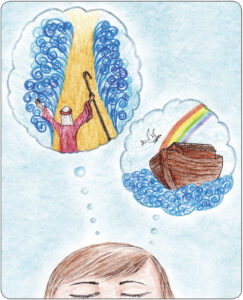 This illustration by Turning to God’s Word co-founder Tami Palladino depicts two significant Old Testament events—Moses parting the Red Sea so that the Israelites could escape from Egypt, and the dove flying over Noah’s ark, the means God chose to protect Noah and his family. In both events, water is a destructive element that God’s people must avoid in order to escape death. The Church interprets both of these events as types of the sacrament of Baptism. If you were writing a Psalm today celebrating salvation, what New Testament events would you include? For what reasons? Click on Tami’s illustration (right) to enlarge it. Her original illustration is on page 75 in Sing a New Psalm: Communicating with God Through the Prayers of the Church—Volume I: Lauds & Vespers.
This illustration by Turning to God’s Word co-founder Tami Palladino depicts two significant Old Testament events—Moses parting the Red Sea so that the Israelites could escape from Egypt, and the dove flying over Noah’s ark, the means God chose to protect Noah and his family. In both events, water is a destructive element that God’s people must avoid in order to escape death. The Church interprets both of these events as types of the sacrament of Baptism. If you were writing a Psalm today celebrating salvation, what New Testament events would you include? For what reasons? Click on Tami’s illustration (right) to enlarge it. Her original illustration is on page 75 in Sing a New Psalm: Communicating with God Through the Prayers of the Church—Volume I: Lauds & Vespers.
the mystery of the sacrament of Baptism
The account of Noah and the Flood is recorded in the sixth through ninth chapters in the book of Genesis, while the story of Moses leading God’s people through the Red Sea is recorded in the fourteenth chapter in the book of Exodus. Both Old Testament events foreshadow the way in which Jesus leads his followers out of slavery to sin. The following thought-provoking description of the sacrament of Baptism is from a homily by Basil of Seleucia, a bishop who lived in the 4th century.
Consider what Baptism is and proclaim its grace. All blessings are contained in it. It purifies the world; it restores nature. It is a speedy redemption, a simple remedy, a liquid fire that burns away sin, a sponge that purifies conscience, a garment that never wears out. It is a womb that conceives without passion, a tomb in which those who are buried are born again. It is the ocean in which sins are drowned, the element that witnesses to the devil’s defeat. It is the seal of him who takes possession of the fortress, the unfailing advocate before the Judge. It is the stream that extinguishes the fires of hell, the grace that gives admission to the supper of the Lord. It is a mystery, both old and new, foreshadowed even in the time of Moses. To Christ our God be glory forever, through endless ages.
 all about the waters of Baptism
all about the waters of Baptism
Learn more about biblical account of the Flood in Lesson 6 The Great Flood & God’s Covenant with Noah in the Turning to God’s Word Catholic Bible study In the Beginning: The Book of Genesis. For more  information about how the sacrament of Baptism is prefigured in the Old Testament, see Lesson 12 Deliverance Through the Red Sea in our Bible study You Shall Have No Other Gods: The Book of Exodus.
information about how the sacrament of Baptism is prefigured in the Old Testament, see Lesson 12 Deliverance Through the Red Sea in our Bible study You Shall Have No Other Gods: The Book of Exodus.
WHAT DO YOU THINK about this continuing theme of covenant?
 The prayers for Sunday Second Vespers (Week II) drew attention to God swearing an oath and entering into a covenant with his people. The prayers for Monday Lauds (Week II) mention the crossing of the Red Sea and Noah’s ark. These Old Testament events also are connected to God’s covenant relationship with his people.
The prayers for Sunday Second Vespers (Week II) drew attention to God swearing an oath and entering into a covenant with his people. The prayers for Monday Lauds (Week II) mention the crossing of the Red Sea and Noah’s ark. These Old Testament events also are connected to God’s covenant relationship with his people.
? What are the signs of the covenant in each of those events?
? What modifications does God make to the original covenant seen described in the book of Genesis 2:15–17? If necessary, also refer to Lesson 2 It Is Not Good That the Man Should Be Alone  in the Turning to God’s Word Catholic Bible study In the Beginning: The Book of Genesis.
in the Turning to God’s Word Catholic Bible study In the Beginning: The Book of Genesis.
? What remains the same about all of these covenants?
? What’s the New Covenant enacted by Jesus Christ in the New Testament?
? What’s the sign of this New Covenant?
? How does this New Covenant differ from the covenants of the Old Testament?
? How are these two covenants the same?
 glory—you could look it up in our archives
glory—you could look it up in our archives
“Glory” is a word that most of us think we understand until we attempt to define it. To learn about the glory of the LORD mentioned in Psalm 96 and how it’s related to orthodoxy, read Lost in Translation, an online column in which Turning to God’s Word author Matthew Phelps helps readers connect with ideas expressed in the original languages of the Scriptures. New Lost in Translation entries are posted on Mondays, and past entries are archived on our website. Contact us if you’d like to receive Lost in Translation by email every week.
Q&A—sometimes there’s no single right answer
We’re used to seeing the patriarchs listed as Abraham, Isaac, and Jacob, so it can be disconcerting to suddenly encounter Jacob and Joseph instead. We can only speculate about why the Psalmist chose to limit his reference to these two Old Testament figures, but thinking about possible reasons can open new insights into how our Christian faith relates to its Hebrew roots.
 Q: A participant in this study has asked for clarification about how to respond to Question 4 on page 75 in Sing a New Psalm: Communicating with God Through the Prayers of the Church—Volume I: Lauds & Vespers. The question in the study text directs readers to consider why the Psalmist chose to mention Jacob and Joseph in Psalm 77 rather than going with the more common patriarchal grouping of Abraham, Isaac, and Jacob. We’re including that question here for readers without access to a print or digital copy of Sing a New Psalm: Communicating with God Through the Prayers of the Church—Volume I: Lauds & Vespers.
Q: A participant in this study has asked for clarification about how to respond to Question 4 on page 75 in Sing a New Psalm: Communicating with God Through the Prayers of the Church—Volume I: Lauds & Vespers. The question in the study text directs readers to consider why the Psalmist chose to mention Jacob and Joseph in Psalm 77 rather than going with the more common patriarchal grouping of Abraham, Isaac, and Jacob. We’re including that question here for readers without access to a print or digital copy of Sing a New Psalm: Communicating with God Through the Prayers of the Church—Volume I: Lauds & Vespers.
Question 4 When calling to mind the wondrous deeds of the LORD, the Psalmist specifically mentions Jacob and Joseph. Based on previous knowledge of the Scriptures, what might explain why these particular patriarchs are named and not Abraham and Isaac? If necessary, refer to the book of Genesis 12:1—50:26. How are Jacob and Joseph associated with God’s displays of power in the Old Testament?
A: Because this is a “what do you think?” question, there’s no right or wrong answer. We can offer some guidance on one way to approach a question such as this. A good place to start is by examining what the lives of Jacob and Joseph have in common that seems to be missing in the lives of Abraham and Isaac. This requires some familiarity with chapters 12–50 in the book of Genesis, a fairly large amount of biblical material. Readers may find the  following questions helpful when considering how they respond to Question 4. You can learn a great deal more about the early roots of Christianity in our in-depth Catholic Bible study In the Beginning: The Book of Genesis.
following questions helpful when considering how they respond to Question 4. You can learn a great deal more about the early roots of Christianity in our in-depth Catholic Bible study In the Beginning: The Book of Genesis.
? Consider what was the No. 1 threat to Joseph’s life?
? How does this match up with the No. 1 threat to Jacob’s life?
 ? What about Abraham and Isaac? Were either of them threatened in the same way as Joseph or as Jacob?
? What about Abraham and Isaac? Were either of them threatened in the same way as Joseph or as Jacob?
? Assuming a common danger faced by Jacob and Joseph, how was it that they were rescued?
? What role did God play in rescuing each of them?
? What point might the Psalmist be making about the type of dangers that these two Old Testament figures faced?
? Refer to the positions of Jacob and Joseph in the genealogy in the first chapter in the Gospel According to Matthew to consider how the role these patriarchs play in the Old Testament foreshadows the role of their same-name descendants in the New Testament.
the popes inspire us—an inclusive view of the citizens of Zion
 Psalm 87 presents an exceptionally broad view of the peoples who are registered as natives of the city of Zion. In “The Foundation of God’s Plan” on page 76 in Sing a New Psalm: Communicating with God Through the Prayers of the Church—Volume I: Lauds & Vespers, an excerpt from a papal audience, Pope St. John Paul II explains that this Psalm identifies all peoples of the earth as belonging to God: “This is the official juridical expression which at that time declared that a person was a native of a specific city, and as such, entitled to enjoy all the civil rights of that people.” Consider what rights are provided by God to his people.
Psalm 87 presents an exceptionally broad view of the peoples who are registered as natives of the city of Zion. In “The Foundation of God’s Plan” on page 76 in Sing a New Psalm: Communicating with God Through the Prayers of the Church—Volume I: Lauds & Vespers, an excerpt from a papal audience, Pope St. John Paul II explains that this Psalm identifies all peoples of the earth as belonging to God: “This is the official juridical expression which at that time declared that a person was a native of a specific city, and as such, entitled to enjoy all the civil rights of that people.” Consider what rights are provided by God to his people.
something else to think about
Psalm 87 describes the city of God and its inhabitants. More information about this image appears in “Jerusalem as a Type” on page 76 in Sing a New Psalm: Communicating with God Through the Prayers of the Church—Volume I: Lauds & Vespers. How would you explain to someone who is interested in learning more about your Catholic faith why it is that Christians as well as Jews consider the holy city of Jerusalem to be the mother of the children of God?
ex libris—a good book to read in conjunction with this Bible study
The Lord Reigns: A Theological Handbook to the Psalms by James L. Mays provides insight into the 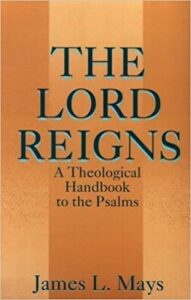 Psalms as an aid to understanding the importance of the ancient
Psalms as an aid to understanding the importance of the ancient Hebrew view of one God who rules over all of time and space. Mays interprets the phrase “the LORD reigns” as the unifying concept underlying all of the Psalms. This makes the Psalms extremely relevant for anyone seeking to follow Christ the King in a secular world that generally doesn’t recognize this foundational belief of Christianity. Mays’ thought-provoking book offers clear rewards for anyone seeking to understand more about how the Old Testament concept of God as King applies to the practice of Christianity. Read excerpts and learn more about The Lord Reigns and other works related to Bible
Hebrew view of one God who rules over all of time and space. Mays interprets the phrase “the LORD reigns” as the unifying concept underlying all of the Psalms. This makes the Psalms extremely relevant for anyone seeking to follow Christ the King in a secular world that generally doesn’t recognize this foundational belief of Christianity. Mays’ thought-provoking book offers clear rewards for anyone seeking to understand more about how the Old Testament concept of God as King applies to the practice of Christianity. Read excerpts and learn more about The Lord Reigns and other works related to Bible  study at ex libris—main bookshelf. Learn more about the Old Testament precursor to Jesus’ kingdom in the Turning to God’s Word Catholic Bible study The United Kingdom of Israel: Saul, David & Solomon Foreshadow Christ the King.
study at ex libris—main bookshelf. Learn more about the Old Testament precursor to Jesus’ kingdom in the Turning to God’s Word Catholic Bible study The United Kingdom of Israel: Saul, David & Solomon Foreshadow Christ the King.
read the Catechism—Church teaching about the reign of Christ the King
Paragraphs 680–682 in the Catechism of the Catholic Church explain in a nutshell the end of time.
 680 Christ the Lord already reigns through the Church, but all things of this world are not yet subjected to him. The triumph of Christ’s kingdom will not come about without one last assault by the powers of evil.
680 Christ the Lord already reigns through the Church, but all things of this world are not yet subjected to him. The triumph of Christ’s kingdom will not come about without one last assault by the powers of evil.
681 On Judgment Day at the end of the world, Christ will come in glory to achieve the definitive triumph of good over evil which, like the wheat and the tares, have grown up together in the course of history.
682 When he comes at the end of time to judge the living and the dead, the glorious Christ will reveal the secret disposition of hearts and will render to each man according to his works and according to his acceptance or his refusal of grace.
the best Catholic commentary about Scripture
 To find out more about how Church teaching is supported by passages in Sing a New Psalm: Communicating with God Through the Prayers of the Church—Volume I: Lauds & Vespers, check out the Index of Citations in the Catechism of the Catholic Church. Links to the primary Scripture passages in the lesson (Revised Standard Version Catholic Edition [RSVCE*]) and relevant paragraphs in the Catechism are provided here. Not every passage in the biblical text for this study is referenced in a Catechism paragraph, however, including Psalm 77 and Psalm 87 in this lesson.
To find out more about how Church teaching is supported by passages in Sing a New Psalm: Communicating with God Through the Prayers of the Church—Volume I: Lauds & Vespers, check out the Index of Citations in the Catechism of the Catholic Church. Links to the primary Scripture passages in the lesson (Revised Standard Version Catholic Edition [RSVCE*]) and relevant paragraphs in the Catechism are provided here. Not every passage in the biblical text for this study is referenced in a Catechism paragraph, however, including Psalm 77 and Psalm 87 in this lesson.
don’t forget about our indexes & extra online material

 If you’re trying to locate information about a specific Scripture passage, you can look it up in the index at the back of the study book or sample lesson. If you want to find a particular commentary, you can look up its title in the topics index. To learn more about another book of the Bible for which there’s a Turning to God’s Word study, visit the online study directories to read the commentaries and watch any accompanying videos. Finally, if you have a question or would like to make a comment about any of our studies, you can use one of the “ask us your question” or “what do you think” buttons to email our authors.
If you’re trying to locate information about a specific Scripture passage, you can look it up in the index at the back of the study book or sample lesson. If you want to find a particular commentary, you can look up its title in the topics index. To learn more about another book of the Bible for which there’s a Turning to God’s Word study, visit the online study directories to read the commentaries and watch any accompanying videos. Finally, if you have a question or would like to make a comment about any of our studies, you can use one of the “ask us your question” or “what do you think” buttons to email our authors.
ex libris—Church documents & books about religious topics
Link to magisterial documents referred to in our Bible studies at ex libris—magisterial documents.  This listing includes significant recent encyclicals as well as a number of historical Church documents. Recommended books related to Scripture study can be found at ex libris—main bookshelf.
This listing includes significant recent encyclicals as well as a number of historical Church documents. Recommended books related to Scripture study can be found at ex libris—main bookshelf.
wondering how to pronounce some of these words?
The following links are to readings from the New International Version (NIV) Bible. To listen, open one of the links and click on the audio icon above the printed text. Although not taken from the translations used in our study materials, the NIV readings provide an audio guide to pronunciation of words in this lesson’s primary biblical texts. A close online version of the translation of the Bible used in Catholic liturgy in the United States as well as an audio guide for daily Mass readings for the current month can be found on the website of the United States Conference of Catholic Bishops (USCCB).
Psalm 77 (NIV)
Psalm 87 (NIV)
Psalm 96 (NIV)
 close with a Psalms-based prayer for Monday Lauds (Week II)
close with a Psalms-based prayer for Monday Lauds (Week II)
Many of our Catholic study groups like to conclude their discussions with a prayer based on the scriptural focus of their lesson. If you’re uncomfortable composing your own Bible-based prayers, you can follow our four easy steps. If you prefer, you can pray any of the Psalms in this lesson, or you can use the following short prayer.
O God, you have worked wonders
for your people since the beginning of time.
Help us to remember all of your miraculous deeds,
and grant that we always may honor
the sacrifice made by your Son, Jesus Christ,
to free us from slavery to sin. Amen.
Lesson 19 For the Peace of Jerusalem Pray, Monday Vespers (Week II)—Psalm 122, Psalm 125, Psalm 126, and Psalm 127
Lesson 17 The LORD Has Sworn an Oath, Sunday Second Vespers (Week II)—Psalm 110, Psalm 113, and Psalm 114
you also may like our study of the book of Genesis
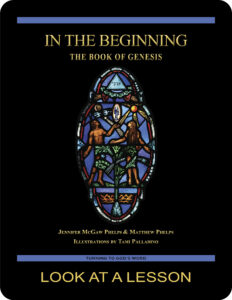 The first seven lessons of In the Beginning: The Book of Genesis, a 28-lesson Catholic Bible study with an imprimatur, provide an in-depth look at the very earliest biblical history—including the two accounts of Creation, events surrounding the Fall of Adam and Eve, the relationship between Cain and Abel, and the baptismal foreshadowing present in the account of Noah and the Flood. Remaining lessons look at lives of the patriarchs Abraham, Isaac, Jacob, and Joseph. Click on the book’s cover to view a sample lesson.
The first seven lessons of In the Beginning: The Book of Genesis, a 28-lesson Catholic Bible study with an imprimatur, provide an in-depth look at the very earliest biblical history—including the two accounts of Creation, events surrounding the Fall of Adam and Eve, the relationship between Cain and Abel, and the baptismal foreshadowing present in the account of Noah and the Flood. Remaining lessons look at lives of the patriarchs Abraham, Isaac, Jacob, and Joseph. Click on the book’s cover to view a sample lesson.
start a Turning to God’s Word Bible study
Thank you for your interest in Sing a New Psalm: Communicating with God Through the Prayers of the Church—Volume I: Lauds & Vespers. 
 More information about beginning a Turning to God’s Word Bible study can be found on this website at start a Bible study, and Tami, Matthew, and I are available to answer questions or discuss concerns. Contact us to start this or one of our other studies or to have your schedule listed with other TtGW study groups on our website. —Jennifer
More information about beginning a Turning to God’s Word Bible study can be found on this website at start a Bible study, and Tami, Matthew, and I are available to answer questions or discuss concerns. Contact us to start this or one of our other studies or to have your schedule listed with other TtGW study groups on our website. —Jennifer
*There are seven deuterocanonical books in the Old Testament—the Books of Tobit, Judith, Wisdom, Sirach, Baruch, and First and Second Maccabees, as well as some passages in the Books of Esther and Daniel. Protestants usually refer to these works as “apocryphal,” a word that means “outside the (Protestant) canon” because they’re excluded from most Protestant Bibles. The word “deuterocanonical” means “second canon”; Catholics use that word to refer to any section of the Catholic Old Testament for which there are no extant, or existing, Hebrew manuscripts. All of the deuterocanonical books appear in the Septuagint, the earliest remaining versions of which date to the 1st century B.C. This Greek translation of the Old Testament was in common use by Jews at the time of Jesus. Learn more by reading How Do Catholic & Protestant Bibles Differ?
Turning to God’s Word printed Bible studies use the 2006 Revised Standard Version Second Catholic Edition (RSV2CE) translation for all Scripture references except the Psalms, which are taken from The Abbey Psalms and Canticles, prepared by the monks of Conception Abbey and published in 2020 by the United States Conference of Catholic Bishops (USCCB). All Scripture links for the online study pages for Sing a New Psalm: Communicating with God Through the Prayers of the Church—Volume I: Lauds & Vespers are to the 1966 Revised Standard Version Catholic Edition (RSVCE) translation. The New International Version (NIV) audio recordings follow the same chapter and verse numbering as the RSV Catholic translations, but the NIV doesn’t include the deuterocanonical passages.
The 1966 RSVCE uses archaic pronouns and verb forms such as “thee,” “thou,” “didst” in the Psalms and in direct quotations attributed to God. The 2006 RSV2CE replaces these with more accessible English. The few significant translation changes in the RSV2CE include rendering almah as “virgin” in the Book of Isaiah 7:14 and restoring the term “begotten” in the Gospel According to John 3:16.
The Psalms in this Bible study reflect numbering used in The Abbey Psalms and Canticles; Psalms numbering may vary in other translations. Numbering also may vary for a few other passages in this Bible study. Turning to God’s Word studies follow the numbering in the Revised Standard Version Catholic translations (RSVCE and RSV2CE). Discrepancies in the New American Bible Revised Edition (NABRE) are noted in the Index of Scripture Citations in the study book and the online sample.
 The companion to this Catholic Bible study from Turning to God’s Word, Sing a New Psalm: Communicating with God Through the Prayers of the Church—Volume II: Vigils, Day Prayer & Compline, will cover Psalms not included in Volume I: Lauds & Vespers. Volume II: Vigils, Day Prayer & Compline is scheduled for publication in 2025.
The companion to this Catholic Bible study from Turning to God’s Word, Sing a New Psalm: Communicating with God Through the Prayers of the Church—Volume II: Vigils, Day Prayer & Compline, will cover Psalms not included in Volume I: Lauds & Vespers. Volume II: Vigils, Day Prayer & Compline is scheduled for publication in 2025.
